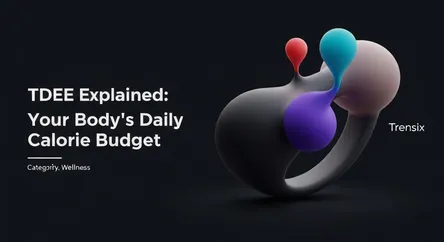Wellness
TDEE Explained: Your Body's Daily Calorie Budget

Understand your Total Daily Energy Expenditure (TDEE), the total calories you burn in a day, to better manage your weight and fitness goals.
What is it?
Total Daily Energy Expenditure (TDEE) is the total number of calories your body burns in a 24-hour period. Think of it as your personal daily energy budget. This expenditure includes not just the calories you burn during intentional exercise, but all the energy your body uses to function. TDEE is made up of four key components:
- Basal Metabolic Rate (BMR): The energy used for basic functions at rest, like breathing and circulation, which accounts for about 60-75% of your TDEE.
- Thermic Effect of Food (TEF): The calories burned digesting and absorbing food, typically making up about 10% of your daily expenditure.
- Exercise Activity Thermogenesis (EAT): Calories burned during planned exercise like running or weightlifting.
- Non-Exercise Activity Thermogenesis (NEAT): Energy used for all other daily movements, such as walking, fidgeting, and doing chores.
Why is it trending?
TDEE has become a popular concept in wellness and fitness due to a shift towards more personalized health and nutrition strategies. The rise of fitness trackers and apps has made it easier for people to estimate and monitor their daily activity levels and caloric burn. This accessibility allows individuals to move beyond generic diet plans. Instead of just counting calories consumed, people are now focused on understanding their unique energy needs. This tailored approach is seen as a more effective and sustainable way to manage weight and optimize fitness results.
How does it affect people?
Understanding your TDEE empowers you to take control of your health and fitness goals. By knowing your daily calorie budget, you can make informed decisions about your food intake to achieve specific outcomes. For weight loss, you can create a sustainable calorie deficit by eating slightly less than your TDEE. For muscle gain, you can aim for a small caloric surplus. This knowledge helps prevent common pitfalls like under-eating, which can slow metabolism, or overeating, which can lead to unwanted fat gain. Ultimately, using TDEE as a guide allows for a more balanced and effective approach to diet and exercise, helping people reach their goals without extreme measures.